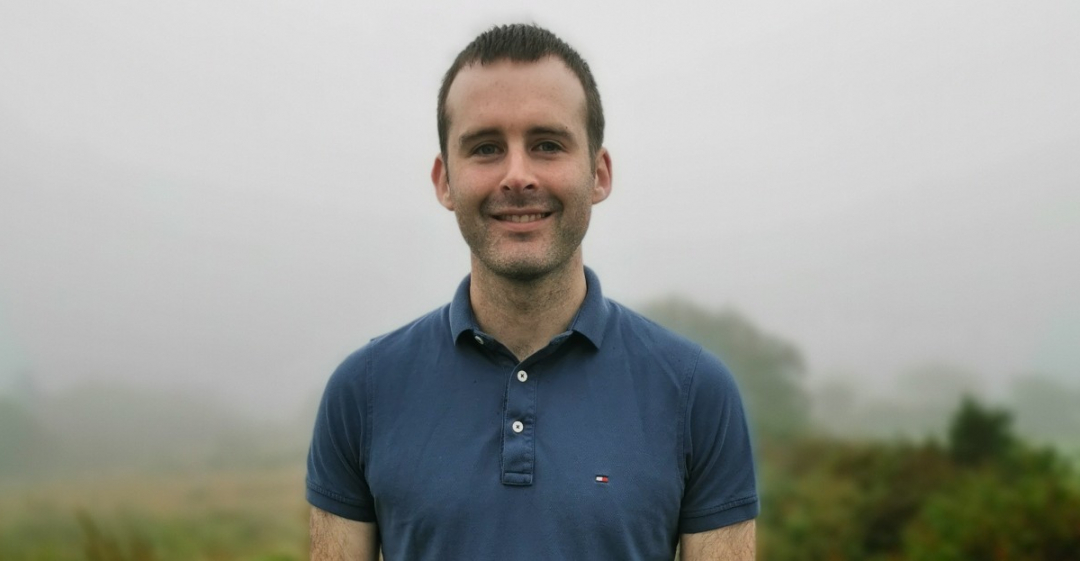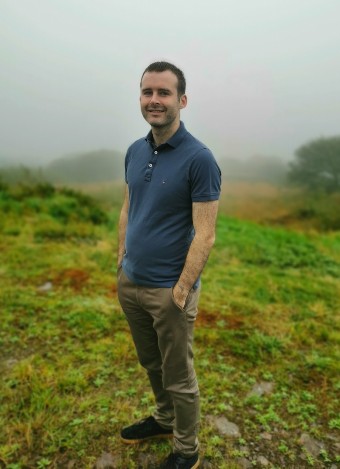“I felt like I was climbing up a ladder that I didn't want to be on.”

What work were you doing previously?
I worked for ten years as an accountant.
I started out in practice as an auditor, before moving into industry, working predominantly as a financial accountant.
What are you doing now?
I work in fundraising in the charity sector, predominantly within individual giving and direct marketing.
In my current role, I oversee a variety of different fundraising income streams and manage integrated direct marketing campaigns across several channels including direct mail, email, telemarketing, press, television, radio and digital.
I'm also involved heavily in fundraising strategic development and I currently manage a team of three.
How did you feel in your work before you decided to make the change?
Being young and naive, I jumped into a career that wasn't right for me.
I started out as an auditor and I just couldn't seem to grasp the technical knowledge required to excel in the job. I knew I was reasonably intelligent, yet in this job I came home every day feeling like I was stupid.
With the benefit of hindsight, the reason I couldn't grasp auditing was because I had absolutely no interest in it. I was miserable and regularly daydreamed about quitting. I used to moan an awful lot, and my friends and family were no doubt sick of my whingeing.
I eventually decided to leave practice, and I moved into industry, working in a variety of roles in both Dublin and Melbourne over the course of seven years.
It was definitely an improvement from practice. I felt competent in my work and I was considerably less stressed. But I wasn't fulfilled. I found myself bored by the repetitive nature of the roles. I never felt like I was adding a lot of value to the organisations I was working for.
I finished my professional ACCA chartered accountancy exams, which I'm still very proud of. This could have been a springboard to bigger and better things within accountancy.
However, there was always that sense that I was climbing up a ladder that I didn't want to be on.
Why did you change?
I'd thought about making a career change many times over the course of my ten years as an accountant.
However, I never really knew how to go about it, and would default back into roles that were similar to the one I'd previously worked in.
I thought that moving to Australia (I lived there for three years) would be an opportunity to get into something new, but I just found myself back in accountancy when I moved there – partly out of fear, and partly out of not really knowing what else to do, or how to get into something new with no experience.
Over the years, I began to realise that my personality just didn't fit into the accountancy profession. I met a lot of nice people through it, but I always felt like I didn't really fit in with them.
Being honest, I felt like a bit of an imposter, in both the accountancy world, and also the corporate world in general.
I found that in most of the jobs I worked in as an accountant, most of my colleagues also seemed deeply unhappy in their roles. This constant wave of negativity was very hard to ignore and only served to make me feel even more unhappy in my job.
When was the moment you decided to make the change?
I started doing some freelance sports journalism for track and field athletics on the side a few years previously.
I regularly travelled to big sporting events, such as the Olympic Games and World Athletics Championships, as a freelance journalist. These experiences were hugely exhilarating, and immensely rewarding.
After coming back from the World Athletics Championships, I found going back to my regular job a huge come-down. I'd experienced this feeling in previous years, but on this occasion, it felt so much worse. It was at this point I knew I needed to get out.
I could have moved to another accountancy job and got a new lease of life for a few months, but the same old problems around boredom and lack of fulfillment would have reared their ugly heads again.
I needed a complete change.
How did you choose your new career?
I fantasised regularly about doing something else – at times anything else.
I brainstormed in my head a lot about possible things I could do: journalism, secondary school teaching, personal training, sports administration, marketing, and so on. I think I had to go through this process and weigh up the pros and cons of each, before landing on something concrete.
I was reluctant to go back to university and spend years earning very little. I had studied marketing as part of my commerce degree, and had enjoyed it, but had never actually worked in it. I decided I'd try to get into marketing of some kind.
As mentioned above, I had a good few years experience working as a freelance sports journalist on the side, and had my own website too. I packaged all this on my CV to make it more relevant to marketing and communications.
Are you happy with the change?
I couldn't be happier with the change.
Fundraising is a very demanding profession, but incredibly rewarding. It's a nice feeling knowing that the work I'm doing now is ultimately helping people in need, something which was never the case when working in the for-profit world.
No two days are the same, I'm never bored, and I'm often out of my comfort zone. There's always something new to learn, and I've been blessed with a great manager who acts as a career development mentor as much as a manager.
In my previous career I never felt like I fitted in with the people I worked with. Once I moved to fundraising, I instantly felt at home with the people who work in the field. I've found that, in general, the people who work in the profession have a similar personality to me, and share similar values. They're a joy to be around, and I look forward to going into work to spend time with them. I've made genuine friends through it; this is perhaps the most rewarding thing of all.
A job is nothing without great people.
What do you miss and what don't you miss?
The only thing I miss about accountancy is the greater earning potential.
There's a much higher ceiling on what one can earn in accountancy compared to fundraising in the non-profit world.
But I'd be here all year if I was to mention all the things I don't miss about my previous career! The main thing is that daily feeling of complete lack of fulfillment and the feeling I was contributing no real value to the organisations I was working for. There was no sense of accomplishment.
How did you go about making the shift?
I quit my accountancy job with nothing lined up.
I took inspiration from that episode of 'Friends', where Joey said to Rachel that she needed 'the fear' and that as long as she was in the job she hated, she wouldn't have the motivation to go after something she truly wanted.
I decided to give myself three months, and if I didn't find anything, I had the fallback option to just get another accountancy job.
I applied for about 50 or 60 marketing-related jobs, literally anything related to marketing. I didn't have any 'traditional' marketing experience so I expected a lot of rejection. In total I got just three interviews. Thankfully out of these I got one job offer, as a maternity cover in direct marketing within the fundraising department of a charity in Dublin. This got my foot inside the door of a new career, and thankfully the experience was absolutely fantastic.
I hadn't planned to get into fundraising. Truth be told, I didn't even know it was a career option. I sort of just fell into it. But it has been the best slice of good fortune I've had in my life.
How did you develop (or transfer) the skills you needed for your new role?
Going into my first role in fundraising, I was fortunate to have two very different skills on my CV: journalism and accountancy.
I didn't have 'traditional' marketing and fundraising experience, but I think having experience in both these areas helped me get noticed and get my foot in the door.
Journalism is useful as there is a fair bit of copywriting, editing and creative development as part of fundraising. The accountancy background has proven to be a big asset too. Fundraising involves a lot of financial planning, forecasting, reporting and analysis, and I work with data a lot.
Funnily enough, I really enjoy using my accountancy skills in a totally different field. This side of my job is much more like management accounting as opposed to financial accounting.
What didn't go well? What wrong turns did you take?
After my first role in fundraising finished up, I took a role that in hindsight I shouldn't have taken.
It was a fundraising and marketing role as part of a charity wing within a professional membership body, rather than a traditional charity. The environment was completely corporate and there was no fundraising culture in the organisation, nor was there any desire to develop one.
I felt like I was back where I started, albeit in a different role. I couldn't handle the corporate nature of the workplace and once again, I didn't feel like I belonged with the people who worked there. It all felt like a big misstep in my career.
I decided to leave the job after six months. Shortly afterwards I got a much better role within a traditional charity again, and have developed so much since then.
How did you handle your finances to make your shift possible?
I had saved quite a bit when working as an accountant, so I was fortunate that I had a good bit of wiggle room to attempt a career change.
I suspected I might have a few months without any earnings, and I had enough of a buffer to get me through that stress-free. In the end, I was only out of work for about a month and a half.
I took a drop in salary too, which I expected I would have to do when moving career, but it wasn't a terrible hit.
What was the most difficult thing about changing?
The most difficult thing I found about changing career was actually overcoming the fear holding me back.
It's so easy to go down a certain path, and then after several years feel that it's all you know – you can feel quite institutionalised after a while. I always wanted to escape the accountancy world, but for so long I felt at a loss as to how to do it. I would ultimately talk myself out of changing, and put it on hold for a while. Rinse. Repeat.
What help did you get? 
I talked about changing careers a lot with my partner and she was incredibly supportive – this definitely made a challenging process much easier.
A friend of mine from college, who works in marketing, kindly gave me her time, and advised me on how I could improve my CV in advance of applying for marketing jobs. This help was invaluable and I’m forever grateful to her for this.
What have you learnt in the process?
I've learnt to trust my gut more.
For years I would block out the voice inside me telling me to get out of the rat race I was in. The day I handed in my notice in my last accountancy job was a proud one. I'd gone back and forth on it for a few weeks, terrified to actually make such a big decision, and face an unknown future. Once I'd gone through with it, I had this liberating feeling, like a weight had been lifted from my shoulders.
I think I have become a more decisive person in general since, as a result.
What would you advise others to do in the same situation?
Everyone's situation is different, and what worked for me might not work for somebody else.
Each person has their own life circumstances that they need to consider. I was fortunate that I didn't have considerable financial commitments when I made the decision to switch careers.
But what I would say to somebody unfulfilled in their work life is that 40 hours or so is a high percentage of your waking week to be unhappy for. Quite often, it can spill over into the rest of your life too.
If you're unhappy in your career, don't feel like you're stuck in it for good. Changing careers isn't easy, but it is absolutely possible. You don't have to settle for a life with no fulfillment at work. Gone are the days of 'a job for life'. Many people change careers nowadays.
Sometimes a career change can be a slow burn too. Without the sports journalism that I'd done seasonally, on the side, for several years, I don't think I would have been able to get into fundraising in the manner that I did.
Try to develop your CV by doing something different on the side. It doesn't even need to be something that pays much or even at all, just something that brings some more variety to your CV, that you can package nicely to a potential employer so they can see your potential.
What lessons could you take from James's story to use in your own career change? Let us know in the comments below.



